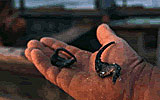Black Sea Trend
Ecological Trend in the Western Black Sea
Significant areas of the seabed had been suffering from anaerobic conditions – a clear indicator of eutrophication – but such problems have now almost completely disappeared from the Western Black Sea, where conditions are now similar to those that prevailed until the 1960s. Fish stocks in these waters are still out of balance, however – mainly as a result of over-fishing.
Reduced phosphorus - improved ecological status
Phosphorus is now the limiting factor for algal growth (eutrophication) and phosphorus inputs into the Black Sea have been halved since around 1990. This seems to be the main reason for ecological improvements in the Western Black Sea.
Since the fact that phosphorus is the limiting factor for eutrophication in the Black Sea, efforts to reduce phosphorus emissions should be continued and strengthened.
The current relatively low inputs of nitrogen and phosphorus to the Black Sea are partly due to the economic recession affecting the former communist countries, which has resulted in:
- dramatic reductions in the application of mineral fertilizers
- closures of large livestock farms (significant point sources of agricultural pollution)
- closures in nutrient-discharging industries (e.g. fertilizer industry)
Economic development as the challenge
These trends have been favourable in environmental terms, but desirable economic developments in these countries are likely to lead to increases in nutrient emissions in the future. The challenge will therefore be to cancel out these possible increases by actively reducing emission levels from both point sources and diffuse sources, in order to keep nutrient inputs at their current low levels while also allowing for the effects of economic development in countries in the middle and lower regions of theDanube Basin.
Disclaimer
The information contained in the ICPDR website is intended to enhance public access to information about the ICPDR and the Danube River. The information is correct to the best of the knowledge of the ICPDR Secretariat. If errors are brought to our attention we will try to correct them.
The ICPDR, expert group members, nor other parties involved in preparation of information contained on this website cannot, however, be held responsible for the correctness and validity of the data and information provided, nor accept responsibility or liability for damages or losses arising directly or indirectly from the use of the information conveyed therein.
Only those documents clearly marked ICPDR documents reflect the position of the ICPDR.
Any links to other websites are provided for your convenience only. The ICPDR does not accept any responsibility for the accuracy, availability, or appropriateness to the user's purposes, of any information or services on any other website.
When using the information and material provided on this website, credit should be given to the ICPDR.

